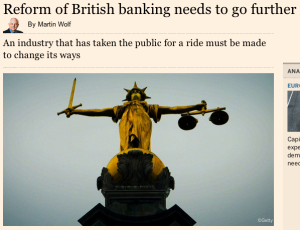FT: Banish fractional reserve banking for real reform


An industry that has taken the public for a ride must be made to change its ways, writes Martin Wolf, the Chief Economics Commentator of the Financial Times, in his article ‘Reform of British banking needs to go further’.
He criticizes the the proposals of the report by the Parliamentary Commission on Banking Standards and demands further action to protect the economy from banking crises in the future.
It is quite likely that the crisis will cost the UK a sixth of gross domestic product, in perpetuity. How is this disaster possible? The answer is that we have entrusted a private industry with the provision of three public or near public goods: the supply of money; the payments system; and the supply of credit. But credit is risky, while money and payment have to be safe. For this reason governments have provided ever stronger safety nets. Profit-seeking bankers have responded by making their institutions increasingly fragile: the desire to make banks safer allows bankers to take more risk.
In response to this article, Thomas Mayer, Deutsche Bank Senior Advisor (and former IMF economist and former Chief Economist of Deutsche Bank Group and Head of DB Research) has written a letter entitled ‘Banish fractional reserve banking for real reform’. It reads:
But no reform can make banking really safe as long as the industry operates within a fractional reserve system, where banks create “inside” money (for example sight deposits) by extending credit and promise to exchange this against “outside” (ie central bank) money at any time on demand.
He also introduces in his letter a four-step plan for banking reform that would implement 100 percent reserves regime.
It’s great to see the discussion about the creation of money by banks and the full reserve banking reform proposals growing even in Financial Times now!